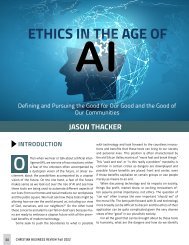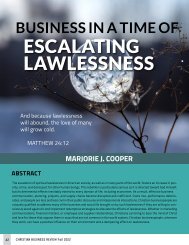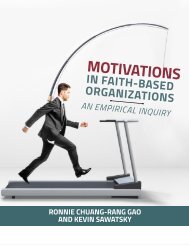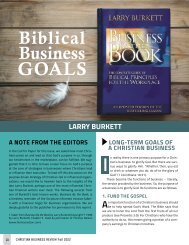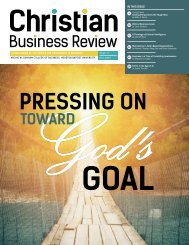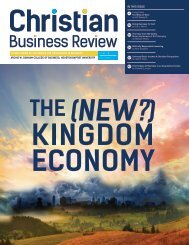Christian Business Review 2018: Kingdom Business in the Brave New World (Issue 7)
You also want an ePaper? Increase the reach of your titles
YUMPU automatically turns print PDFs into web optimized ePapers that Google loves.
shalom and moral imag<strong>in</strong>ation<br />
production by household laborers, it seems appropriate to<br />
extend this ethos of mutual service to today’s employment<br />
relationships and supplier-customer relationships. 39<br />
Moreover, ano<strong>the</strong>r <strong>the</strong>me <strong>in</strong> Luke’s Gospel is decl<strong>in</strong><strong>in</strong>g<br />
to create patronage relationships <strong>in</strong> which one person or<br />
organization becomes a dependent client of ano<strong>the</strong>r. 40<br />
Patronage was widespread <strong>in</strong> <strong>the</strong> Roman empire, and<br />
savvy heads of households (or <strong>the</strong>ir servants entrusted<br />
with management responsibilities) sought opportunities<br />
to expand <strong>the</strong>ir patronage networks. 41 Client households,<br />
hav<strong>in</strong>g become dependent upon <strong>the</strong> patronage of a more<br />
powerful household, could <strong>the</strong>n be exploited for economic<br />
rents 42 , whe<strong>the</strong>r provid<strong>in</strong>g goods or services at a discount<br />
or purchas<strong>in</strong>g <strong>the</strong>m at a markup. Contemporary franchisees,<br />
or firms subject to <strong>the</strong> demands of a controll<strong>in</strong>g<br />
shareholder, or organizations that have a few powerful<br />
customers or suppliers, sometimes experience similar<br />
patronage relationships <strong>in</strong> which <strong>the</strong>ir patron demands<br />
additional purchases of slow-mov<strong>in</strong>g <strong>in</strong>ventory, or <strong>the</strong><br />
reduction of headcount to fund larger dividends, or renegotiations<br />
of payment terms. Yet Jesus spoke of free<strong>in</strong>g<br />
people from patronage when He quoted from Isaiah while<br />
speak<strong>in</strong>g <strong>in</strong> <strong>the</strong> synagogue at Nazareth 43 ... decl<strong>in</strong>ed to become<br />
a patron of a Roman centurion who clearly understood<br />
that his request for <strong>the</strong> heal<strong>in</strong>g of his own servant<br />
would make him a client of Jesus 44 ...and <strong>in</strong>structed His<br />
disciples not to enter patron-client relationships when He<br />
sent <strong>the</strong>m <strong>in</strong>to <strong>the</strong> countryside. 45 Patronage does not seem<br />
to be consistent with shalom.<br />
These pr<strong>in</strong>ciples offer some guidance for <strong>the</strong> <strong>Christian</strong><br />
bus<strong>in</strong>essperson evaluat<strong>in</strong>g a technological <strong>in</strong>novation. As<br />
discussed <strong>in</strong> <strong>the</strong> prior section, a technology often generates<br />
economic value for its <strong>in</strong>ventor or seller <strong>in</strong> one of<br />
three ways: creat<strong>in</strong>g value for <strong>the</strong> user, enabl<strong>in</strong>g <strong>the</strong> user<br />
or owner to capture more of ano<strong>the</strong>r party’s surplus <strong>in</strong><br />
economic transactions, or impos<strong>in</strong>g or obscur<strong>in</strong>g externalities<br />
that shift some of <strong>the</strong> owner’s or user’s costs<br />
to ano<strong>the</strong>r party. Each one can be evaluated <strong>in</strong> terms of<br />
shalom.<br />
Evaluat<strong>in</strong>g value creation through technology <strong>in</strong><br />
terms of shalom<br />
Creat<strong>in</strong>g economic value for users seems non-controversial,<br />
and <strong>in</strong> strictly economic terms it is. However, recall<br />
that any technology embodies <strong>the</strong> values of its <strong>in</strong>ventor. 46<br />
Moreover, <strong>the</strong> designer’s <strong>in</strong>tentions and <strong>the</strong> values that<br />
shape <strong>the</strong>m may sometimes be embodied subtly <strong>in</strong> a given<br />
technology, so that <strong>the</strong>y come to be taken for granted as<br />
“<strong>the</strong> way it works” for users. 47 For <strong>in</strong>stance, social media<br />
users who become accustomed to photographically document<strong>in</strong>g<br />
<strong>the</strong>ir joys, sorrows, outfits, and meals onl<strong>in</strong>e for<br />
a grow<strong>in</strong>g audience of followers and “friends” may with<br />
little consideration start to th<strong>in</strong>k of those events <strong>in</strong> <strong>the</strong>ir<br />
lives as <strong>the</strong> basis of a competition, provid<strong>in</strong>g <strong>the</strong>m with<br />
readily-measurable status, and <strong>the</strong> social media provider<br />
with motivated and creative drivers of site traffic and<br />
CBR PEER REVIEWED ARTICLES<br />
advertis<strong>in</strong>g revenue. Users may adopt a technology for<br />
reasons that are apparent to <strong>the</strong>m, but come to be <strong>in</strong>fluenced<br />
by <strong>the</strong> underly<strong>in</strong>g values of its <strong>in</strong>ventors <strong>in</strong> o<strong>the</strong>r<br />
ways without realiz<strong>in</strong>g it. 48<br />
The values that create economic value ought to be<br />
appropriated discern<strong>in</strong>gly, because economic value may<br />
itself become a consideration that overwhelms all o<strong>the</strong>r<br />
values. This is a caution that is familiar to many <strong>Christian</strong>s,<br />
as “<strong>the</strong> love of money is a root of all k<strong>in</strong>ds of evil.<br />
Some people, eager for money, have wandered from <strong>the</strong><br />
faith and pierced <strong>the</strong>mselves with many griefs.” 49 While<br />
money is clearly useful for purchas<strong>in</strong>g a variety of goods<br />
and services that contribute to human wellbe<strong>in</strong>g, fail<strong>in</strong>g<br />
to discipl<strong>in</strong>e <strong>the</strong> accumulation of capital with <strong>the</strong> question<br />
“how much is enough?” is <strong>the</strong> s<strong>in</strong>e qua non of greed. 50 Yet<br />
<strong>the</strong> reduction of <strong>the</strong> range of o<strong>the</strong>r human goods to some<br />
quantifiable measure of utility, for which money is a convenient<br />
though rough proxy, is both <strong>the</strong> key to <strong>the</strong> power<br />
of rational management 51 and its greatest weakness. 52<br />
That reduction allows a score to be kept, which separates<br />
w<strong>in</strong>ners from losers and good ideas from impractical<br />
ones; it also has <strong>the</strong> advantages of simplify<strong>in</strong>g accountability<br />
and motivat<strong>in</strong>g both managers and <strong>the</strong> managed,<br />
and coord<strong>in</strong>at<strong>in</strong>g <strong>in</strong>terests and <strong>in</strong>centives across a range<br />
of stakeholders who are presumed <strong>in</strong> <strong>the</strong> f<strong>in</strong>al account<strong>in</strong>g<br />
to simply want more capital for <strong>the</strong>mselves. 53 Yet human<br />
wellbe<strong>in</strong>g cannot be reduced to a s<strong>in</strong>gle l<strong>in</strong>ear measure<br />
of utility 54 , and attempts to manage as if it could ignore<br />
<strong>the</strong> o<strong>the</strong>r irreducible qualities of work done well 55 , deny<br />
participants <strong>in</strong> bus<strong>in</strong>ess practices <strong>the</strong> opportunity to enact<br />
<strong>the</strong>ir virtues 56 , debase <strong>the</strong> relationships among people<br />
who are presumed to be only us<strong>in</strong>g one ano<strong>the</strong>r 57 , and ultimately<br />
foster an unsusta<strong>in</strong>able economy of appropriation<br />
and exploitation. 58 To <strong>the</strong> extent that technology fosters<br />
both efficiency and control, us<strong>in</strong>g it could be construed as<br />
contribut<strong>in</strong>g to <strong>the</strong> rationalization sketched above -that is,<br />
to <strong>the</strong> idolatry of money.<br />
Liv<strong>in</strong>g and work<strong>in</strong>g faithfully <strong>in</strong> <strong>the</strong> midst of idol-worship<br />
has been a challenge for <strong>Christian</strong>s s<strong>in</strong>ce <strong>the</strong> <strong>New</strong><br />
Testament era, and Paul’s first letter to <strong>the</strong> Cor<strong>in</strong>thians<br />
provides some helpful guidance. 59 The cults of <strong>the</strong> Greco-<br />
Roman pan<strong>the</strong>on permeated <strong>the</strong> civic and economic life of<br />
ancient Cor<strong>in</strong>th, and ga<strong>the</strong>r<strong>in</strong>gs of political or trade associations<br />
often occurred over meals that <strong>in</strong>corporated <strong>the</strong><br />
ritual sacrifice of <strong>the</strong> entrée to <strong>the</strong> patron god or goddess<br />
of <strong>the</strong> group before it was served to <strong>the</strong> guests. 60 Meat sold<br />
<strong>in</strong> <strong>the</strong> marketplace or served <strong>in</strong> a pagan’s private home<br />
sometimes got <strong>the</strong> same treatment. 61 Because refus<strong>in</strong>g<br />
such food was socially isolat<strong>in</strong>g, some Cor<strong>in</strong>thian <strong>Christian</strong>s<br />
sought Paul’s permission to partake, on <strong>the</strong> grounds<br />
that because <strong>the</strong> pagan gods were fictional <strong>the</strong>ir idols were<br />
powerless, and <strong>the</strong>refore <strong>Christian</strong>s who understood <strong>the</strong>se<br />
facts could eat such food with impunity. 62 Paul <strong>in</strong>stead responded<br />
that while it was true that <strong>the</strong> pagan gods were<br />
“noth<strong>in</strong>g at all” 63 and “everyth<strong>in</strong>g is permissible” 64 , “not<br />
everyth<strong>in</strong>g is beneficial.” 65 <strong>Christian</strong>s ought to aspire not to<br />
CHRISTIAN BUSINESS REVIEW fall <strong>2018</strong> 33




